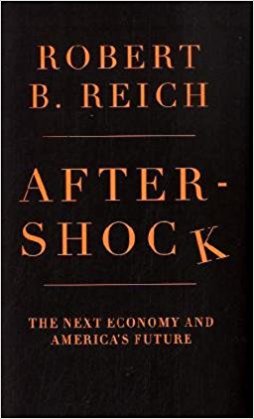Aftershock Summary

6 min read ⌚
 The Next Economy and America’s Future
The Next Economy and America’s Future
Ever noticed how everybody’s talking about the rich and the poor, and nobody’s talking about the middle class? It’s time to change that.
Because the middle class is essential for the economic recovery of US. And, in an instant, you’ll find out why.
Who Should Read “Aftershock”? And Why?
Globalization has certainly made the world smaller. And there’s no question that, for the most part, it’s been a great thing. Increased free trade and competition, as well as simplified communication between nations, are only two of globalization advantages.
However, it has its downsides as well. For one thing, it has led to thousands and thousands of lost jobs in the developed world. How you wonder? Well, it’s pretty obvious once you think about it. In order to maximize profits, companies simply transfer jobs to lower cost countries.
What does this mean for powerhouses such as the United States? The old adage has never rung truer: the rich get richer; the poor get poorer. And the middle class, even though it constitutes the majority of the population, is once again left on the margins.
Yes, we’re talking about you. As does Robert B. Reich in “Aftershock”. In other words, if you’re one of those 70% Americans who considers themselves to be part of the middle class – this book is both for and about you.
And if that’s not enough, let us up the offer a bit. “Aftershock” is for everybody who wants a well-defined, step-by-step solution to US economic problems.
About Robert B. Reich
 Robert B. Reich is an American author, commentator, and professor of public policy at the University of California, Berkeley. He is also a former professor at Harvard University.
Robert B. Reich is an American author, commentator, and professor of public policy at the University of California, Berkeley. He is also a former professor at Harvard University.
Reich has served in three national administrations (under Gerald Ford, Jimmy Carter, and Bill Clinton) and has acted as an adviser to Barack Obama.
He has authored fourteen books and regularly blogs at http://robertreich.org/.
“Aftershock Summary”
If you think that the financial crisis of 2007-8 is a thing of the past – think again! For better or for worse, history tends to repeat itself. And if we don’t learn anything from it, we’ll probably end up making the same mistakes all over again.
So, let us rewind for you a decade or so and remind you of the worst financial crisis since the Great Depression.
It’s 2007, and the world is shocked to learn that the United States is in the middle of an economic crisis. Companies are going out of business. Investment banks are filing for bankrupts. There are even talks of a possible collapse of the world financial system. In a nutshell: if worse, it would have been apocalyptic.
But, how did it get there?
According to the politicians and the analysts, it was the people’s penchant for indebting that did the job. According to Robert B. Reich, however, it was the fact that Americans had to borrow because of the politicians ignoring their pleas for help.
Let’s break this down a bit:
Until the recession – and ever since the 1980s – the US economy showed a continuous upsurging trend. However, the incomes of the middle class stagnated and even started dropping.
In other words: there was money, but it was all going to the rich:
And the rich didn’t spend any of it on creating new jobs. On the contrary: they spent all of it on fairytale mansions and blockbuster yachts. Thus, borrowing evolved to become the middle-class way of blending in. And, before long, things started to get really messy.
Here’s how:
You see, the disparity between the rich and the middle class was enormous to start with. Of course, the politicians didn’t seem to bother. All they talked about was “financial economy”, all the while ignoring the problems of the “real economy”.
Translation: the 1% and Wall Street speculations ran the economy, not the 99% and the consumer demand.
And it got even worse from thereon:
Because the middle class didn’t fight back but simply accepted the state of affairs. And everyone forgot that, as history had taught us, this could only lead to one and one thing only: the total collapse of the system. And it works as hellishly easy as 1-2-3!
At the outset, when one family member doesn’t earn enough money, all family members move into paid work. Then, when this doesn’t work either, everyone starts working longer hours. But the paychecks stay the same, and the prices go higher. Finally, everyone starts borrowing. And, soon enough, everyone lives on other people’s money.
Does it ring any bell?
According to Robert Reich, it should. Because it happened to your great-grandparents in the 1930s, and it wouldn’t have happened to you if you had learned that history lesson. Fortunately, Reich has.
And here are his instructions as to how the government should prevent this from happening ever again.
His idea is simple: a new deal with the middle class is more than necessary:
And the deal starts with “a reverse income tax”, meaning that people who earn less than 50,000 $ per year should receive supplemental pay instead of paying a tax.
The second step is “higher marginal tax rates” based on a person’s earnings. In layman’s terms: the tax rate should increase as the income of the individual rises. If, for example, you earn about 160,000$ per year, you should pay about 40% taxes on your income. However, if you earn 410,000$, it’s only fair that you should pay a bit more, say, 55% taxes.
Finally, the author lists few other government measures that may be as important as these two. The three that stand out are the following. Vouchers for schools depending on household income; carbon taxes in order to eliminate pollution; and health insurance for everybody.
Key Lessons from “Aftershock”
1. The Rich Get Richer…
2. The „Basic Bargain“
3. No Return to Normal
The Rich Get Richer…
Now, who can argue with that? But, as Reich says, it’s not about knowing this – it’s about changing it. Much depends on the government, he says in “Aftershock”. But it also depends on you.
The Basic Bargain
It’s as simple as this: if you don’t have the money to buy things, you’ll just borrow them and you’ll buy the things nevertheless. The economy, however, will eventually collapse because of the excessive debts.
So, the government must make sure that you have the money, by forcing the rich to employ you and give them to you. The good part is that the rich will get some of their money back in due course. Because, once you earn enough, you’ll spend more and more freely.
It’s a win-win situation. And it’s what Reich calls “the basic bargain”.
No Return to Normal
Americans want to be rich. That’s why the middle class has played the rich people’s game for centuries. But, the 2008 financial crisis was the final piece of evidence that the game is rigged. And, according to Reich, that’s about it for the game.
The middle class doesn’t believe the rich as it used to. Unfortunately, this mistrust may lead to revolt and the advent of conservative politics and demagogues. They always know how to use your anger.
Donald Trump happened in 2016. Robert Reich predicted him in 2010.
Like this summary? We’d Like to invite you to download our free 12 min app, for more amazing summaries and audiobooks.
“Aftershock” Quotes
The problem was not that Americans spent beyond their means but that their means had not kept up with what the larger economy could and should have been able to provide them. the American economy had been growing briskly, and America's… Share on X Being rich now means having enough money that you don’t have to encounter anyone who isn’t. Share on X Economic bullying takes many forms but almost always preys on individuals and families that have little or no power and are at the mercy of those who do. Share on X Keynes declared capitalism the best system ever devised to achieve a civilized economic society. But he recognized in it two major faults—“its failure to provide for full employment and its arbitrary and inequitable distribution of… Share on X It is still possible to find people who believe that government policy did not end the Great Depression and undergird the Great Prosperity, just as it is possible to uncover people who do not believe in evolution. Share on XOur Critical Review
“Aftershock” is an informative and easy-to-read book. Written in a down-to-earth language, it’s an in-depth analysis of what has caused the economic crises of the past and an interesting “how-to-stop-them-in-the-future” manual.
Reich’s suggestions for eliminating inequality revolve around the necessity of an interfering government. Regrettably, his “basic bargain” solution is one we may never find out if it’s good enough to work.
Because simply put, Americans would never support governments which will want to implement any of Reich’s reforms. But, who knows? Maybe they should start considering.








